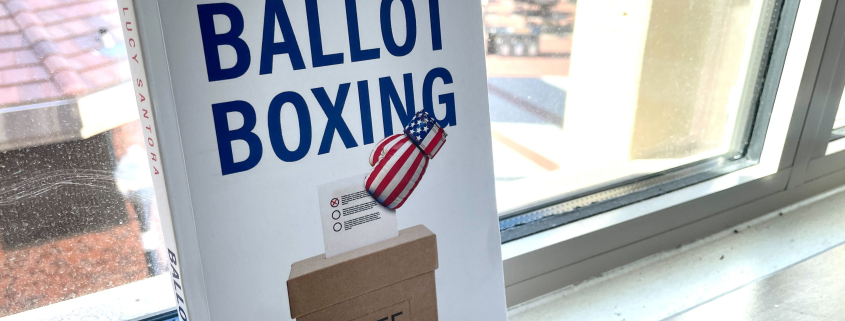USC alum publishes voting rights book

In August 2020, USC alumna Lucy Santora requested a mail-in ballot from her home state of Texas. As November approached, her ballot had still not arrived. She called the Texas Democratic Party, the Texas Republican Party and the voter hotline, but amid the “chaotic” pandemic, their answers remained the same: They didn’t know where her ballot was, and a lot of other people had the same problem.
“I was just very frustrated because I was like, ‘Of everything else that’s kind of gone haywire this year, [voting] should be the one thing I should be able to do,’” Santora said.
After watching the 2020 election results come in and flipping through different news channels, she realized the lack of information surrounding voting. As someone born in a conservative town but raised by liberal parents, Santora said she felt especially equipped to write a book about voting that anyone can read, especially since most conversations around voting become “very partisan, very quickly.”
“I wanted to create something that brought together the good things from both sides of the political spectrum because I don’t think that anyone’s totally right or totally wrong,” Santora said. “And also present it in a way where, as just an everyday person living in America, you’d be able to understand why voting matters for you personally and how that can be something that’s empowering for you and your community to make the change that you actually want to experience.”
Once Santora decided that she wanted to write a book — something that has always been on her bucket list — the next step was to figure out where to start. With a virtual job, a master’s degree and a lot of extra free time because of the pandemic, she decided to reach out to a Georgetown professor to join his class on book writing. On Jan. 21, 2021, she started writing the book and by December, “Ballot Boxing” was written and published.
Though her passion for voting rights grew after the 2020 election, Santora already had experience with the research. Robert Labaree, a political science and international relations librarian, first met Santora in 2018 when she was a research assistant at USC with professor Carol Wise. Labaree recalls that she consistently reached out to him for research help, involving both her personal research and as an assistant.
Labaree said Santora recently contacted him to donate a copy of her book to the USC Library. “Ballot Boxing” will be available in the International and Public Affairs library in the next couple of weeks.
Melody Brown-Clark, USC alumna and Santora’s college friend, said that when Santora struggled to obtain a 2020 election ballot, she was fully prepared to fly home to vote in-person in case her ballot didn’t arrive. She remembers Santora talking about the importance of voting and encouraging the people around her to register.
Brown-Clark said that, over the past four years, she has seen Santora grow into her passions. Watching Santora channel her passions into a book “so well and in such a short period of time was amazing” she said.
“Not that it wasn’t a big deal, but it just came so naturally to her that she made it look easy. It never even seemed hard,” Brown-Clark said.
After reading some of “Ballot Boxing,” Brown-Clark said she felt that Santora has a talent for saying things plainly — and she looks forward to finishing Santora’s book.
“[Santora] is able to put these crazy complex ideas that she understands perfectly in her head into plain words so that other people can understand it,” Brown-Clark said.
Labaree described Santora as “intellectually curious” and as the type of person that you know is “going to do good things in the world.”
“Lucy is just one of those students,” Labaree said. “Just ‘Not only am I studying this on my own, but I want to reach out to somebody to learn what other additional resources are available so I can get a complete picture of the research problem that I’m investigating.”’
Santora said she hopes that people will understand the importance of voting after reading her book, and, most importantly, actually go out and vote. With new restrictive voting laws popping up across the country, she reminds readers that to preserve their power, they need to keep voting even if the “system is messed up.”
“Our political system does not reward a lack of participation, because what they look at, at the end of the day, is ‘this many people voted that they still want this person in power,’” Santora said. “So that person still gets to be in power and do whatever they want … It’s important for people to jump through those extra hurdles that they’re creating to vote so that you can vote them out.”

